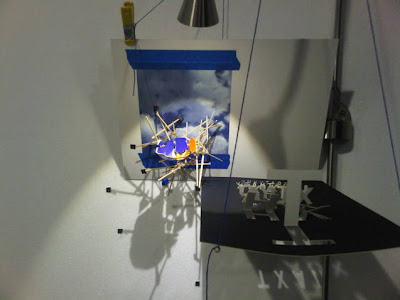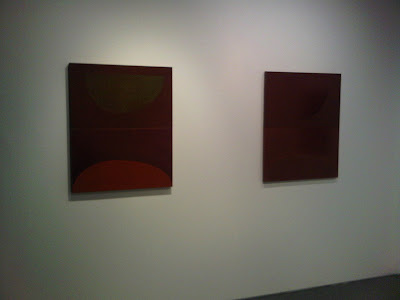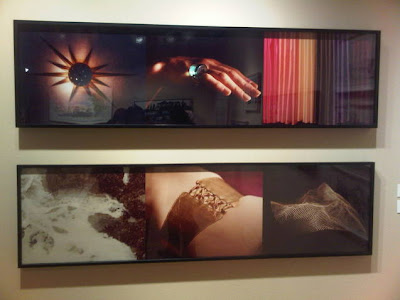I love Sarah Sze's work in Tanya Bonakdar's booth. I have been following her career since she was first represented by Marianne Boesky years ago and she just finished up a fabulous exhibition at the Asian Society. She creates these small worlds from detritus, household objects, string, wire, lights, water bottles, socks....its always a surprise to see what's in there. The work seems delicate, but also expanding and invading your own space. The work seems temporary, but also timeless at the same time. She makes the 2-dimensional into 3-dimensional by using paint drips as a sculptural devices as well as the introduction of paper and 2-d images into her little worlds. The important way to experience her work is to move around it and see it from as many perspectives as possible. It will fool with your spatial perspective, wow you with how mundane items seem to be elevated to elegant, pristine art and the theatricality of it all keeps you fascinated. It must be seen in person to really appreciate it.
Another great booth is Chris D'amelio's exhibition of Daniel Hesidence's paintings. These are small jarring, violent expressionistic portraits of women painted on board in gorgeous tones of maroons, burgundies and reds. The women have blood on their faces and their eyes are gouged and scratched through to the surface of the paint. Its not easy to look at but there is a beauty in the textures, and the installation is wonderful. This is a marked departure from the artist's previous abstractions and the first exhibition by the gallery under its new name D'amelio Gallery from D'amelio Terras.
Another great installation is Susan Frecon's smaller abstractions in the David Zwirner booth. The colors and forms are deep and soothing with a heavy modernist touch. Make sure that you ask to see her small works on paper hidden in the closet. Those are the real gems - these deep tones on delicate paper. They are wonderful!!
I have been a fan of Ori Gersht's work for a while - simply in the fact that its lovely and fun to look at. In CRG's booth, they have dedicated the space to his very large photographs which I believe are film stills from him exploding enormous bouquets of flowers. He does this by using fireworks and then lowering the temperature to a point where they will start to smolder and then explode. You could look at this as a contemporary take on the French and Dutch floral still lifes of the 17th century but I don't think that they really go much deeper than that. The real stars of the show are the much smaller works that are in the booth. The smoke is just starting to swirl around the flowers just anticipating the moment of explosion and another is a close of up the explosion - these are really special and more spectacular than the massive photos.
Before I get to my favorite artist shown at the ADAA, the only non-single artist show that I really enjoyed are the Joseph Cornell and Ray Johnson collages at Richard Feigen's booth. I am insane for Joseph Cornell boxes and collage in all there nostalgic, surreal glory and their references to nature and death - last year L&M had an amazing solo show of Cornell works at the ADAA show and it nearly brought me to tears. I love these two crazy collages by him (the two first images) that are juxtaposed with collages by Ray Johnson. It's an interesting dialogue between these two artists and worth checking out.
The highlight of the ADAA Art show was Margo Leavin's booth and her exhibition of the works by William Leavitt. I don't think he is as well known on the East Coast as he is on the West, but he is an artist who came of age with the other Californian Conceptualists, namely John Baldessari et al. He just had a retrospective at the MOCA in LA last year and he has been working in many different mediums - drawing, photography, painting, performance over the years. His drawings have both a formalist quality as well as surrealist elements. There is a lot attention and influence of architecture with modernist geodesic domes in the background as well idea of the curtain - something hiding and that could possibly revealed. I find a big influence of deChirico in his Leavitt's early palette and spatial arrangement. Like the Conceptualists, there is no narrative or a lot of ambiguity to the objects that are juxtaposed to one another and sometimes the space and arrangements do not make sense - which is the strength of the work as your brain tries figure everything out. I was blown away by the timelessness of it all, and even given the very modernist influences, how up to the minute the work looked to me. He is definitely an artist's artist and you can see how a lot of young West Coast artists have been heavily influenced by him. My favorite works are the last ones - the photographs that are lovely in tone and keep your head spinning with questions about what it all means. The formal qualities of the work are superb - the different textures, the cropping, the lighting, the noirish quality of the works - here he make Conceptualism sexy. His work really blew me away.
Enjoy!!!






































